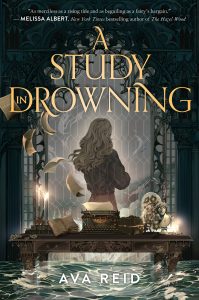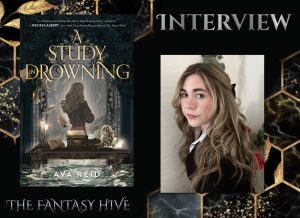Interview with Ava Reid (A STUDY IN DROWNING)
Ava Reid is the award-winning, internationally bestselling author of critically acclaimed adult fantasies Juniper & Thorn and The Wolf and the Woodsman, as well as the forthcoming A Study in Drowning, her young adult debut. Born in Manhattan and raised right across the Hudson River in Hoboken, after obtaining her degree in political science from Barnard College, she moved to Palo Alto, where she continues to haunt university libraries.
Welcome back to the Hive Ava!
Firstly, congratulations on the upcoming publication of your third novel, A Study in Drowning.
Could you tell our readers a little of what they can expect this time round?
Thank you!
A Study in Drowning is a YA dark academia fantasy that follows Effy, an architecture student who desperately wants to study literature but is barred from it because of her university’s archaic, sexist laws. When she sees an advertisement for a competition to design a home honoring her country’s national author–the author of her favorite book–she leaps at the chance. But when she arrives, she finds herself in a remote, crumbling manor, full of disturbing secrets and ruled over by the author’s enigmatic and capricious son. She also meets her academic rival, Preston, who is there for his own reasons: to prove her favorite author was a fraud.
Reluctantly, Effy allies with Preston, hoping to use the credit on his paper to gain entry to the literature college. Together they uncover a decades-old conspiracy, all while being menaced by mysterious, supernatural forces. But the truth is more horrifying than Effy could have imagined, and it might bring her and Preston–and their entire nation–to ruin.
Tell us more about your protagonist, Effy; she’s the only female student in the college of architects, her society is heavily patriarchal. Whose stories are you representing in her?
A Study in Drowning is set in a world inspired by mid-century England and Wales, and Effy belongs to a class of women who would have been among the first non-aristocrats to be able to attend university. While she has the privilege of being upper class, as a woman she is still subjected to horrifically dehumanising institutional sexism.
A Study in Drowning is also a book about mental illness, and the intersection of gender and ableism when it comes to the historic treatment of mentally ill women. Women who were institutionalised, lobotomized, locked away and tortured in padded cells. Unfortunately, these events are not mere relics of the past; the core inhumanity behind these practices remains today.
I wanted to tell the story of a woman who is gaslit, abused, chafing beneath the confines of a patriarchal and ableist society, who is both vulnerable and brave, and who still manages to find her own voice.
 A Study in Drowning follows the Dark Academia route of offering a critique upon certain aspects of academic institutions. As a subgenre, it supports your theme of women silenced by history well. Had you always planned to pair the two, or had this story started as a different beast entirely?
A Study in Drowning follows the Dark Academia route of offering a critique upon certain aspects of academic institutions. As a subgenre, it supports your theme of women silenced by history well. Had you always planned to pair the two, or had this story started as a different beast entirely?
It always started with the university setting, because initially I was going to write a contemporary dark academia story about the Shakespeare authorship question. It became a secondary-world fantasy when I realised I was less interested in the minutiae of anti-Stratfordian theory and more interested in the fraught notion of “what if your favourite author was a fraud?” I set it in an alternate world because I didn’t want readers to come with their own preconceived notions about Shakespeare. I wanted the focus to be on Effy’s character arc and emotional journey as she grapples with her feelings and revelations about Myrddin.
Thus, Myrddin became a fictional amalgam of several real-life authors, all of whom had complex relationships with the women in their lives. The comparison to the Welsh poet Dylan Thomas is perhaps the most apparent, but there are shades of Scott Fitzgerald and Percy Shelley in him as well.
It’s never not infuriating to read about how these famous intellectual men espoused progressive values while wretchedly mistreating their wives. And it is almost impossible to talk about the archetypal “tortured male genius” without talking about the real women who they themselves tortured.
There is also plenty of the Gothic about your story, I particularly liked your take on the framed narrative through Angharad, Effy’s favourite book. With the numerous epitaphs, how much of that story did you also have written up?
I actually didn’t have very much more of it written than what appears in A Study in Drowning. I tried not to be overly indulgent with my in-world lore, because I wasn’t sure how much patience people would have for reading academic discourse about books and authors that don’t exist. But writing the excerpts and epitaphs were some of my favorite parts of the book. I loved building a canon from scratch and imagining what sort of literary traditions this fictional world would have.
I’ve gotten so much unexpected interest from readers that I did end up writing some of Angharad as bonus material for a special edition of ASID. So I hope people enjoy that!
With these themes in mind, were there any particular works of fiction that inspired you? Any further reading for our readers?
There are definitely shades of A.S. Byatt’s Possession in A Study in Drowning, and that book was a big inspiration to me. Possession is also a literary mystery where two rival academics end up falling in love in their quest to uncover obscure lore about a famous (fictional) author, although obviously ASID takes place in a fantasy world. But I think what was most compelling to me about Possession–and what influenced ASID the most strongly–is the theme of obsession and devotion. The sense of ownership that academics feel over their subjects, that people feel over the objects of their affection. The seemingly-effete and remote world of academia is, ultimately, driven by passion, and that’s part of what makes it so compelling to me.
What drew me to request an advanced reader copy of A Study in Drowning were the overtly Welsh references springing out from the press release. You are known for your love of mythologies and folklore, so what made you turn to those of Wales this time?
What has always struck me about Welsh culture is its love and reverence for storytelling, which is reflected in modern traditions like the Eisteddfod. So many “stock” Western fantasy archetypes of fairies, elves, wizards, etc. actually come from Welsh (and broadly Celtic) folklore. So when I started thinking about creating a secondary world where literature was held in high esteem, it made sense for it to be analogous to Wales.
The history of Welsh folklore–its broad dissemination and integration with the modern Western fantasy genre–is inextricably tied to English colonialism of the Celtic countries, which itself is a major theme in A Study in Drowning. I’m always interested in the political salience of fairy tales and folklore; how they contribute to building national identity; how they often connote deep, centuries-old social tensions. These are ideas that crop up in pretty much all of my books, and I wanted to explore them in ASID too.
In line with the previous question, one of my own favourite Welsh myths is that of Cantre’r Gwaelod, the sunken kingdom below Cardigan Bay – represented of course in Llyr’s ‘Bottom Hundred.’ You also mention a similar Breton myth in your notes, that of Kêr-Is. What drew you to this particular story frame?
Literal and metaphorical drowning is, of course, the main theme of A Study in Drowning, and the notion of a sunken land was always central to the story I wanted to tell. There are the socio-political and economic connotations that harken to real-world climate change: the idea that the most deprived people suffer the most when nature takes an unnatural course. There is the deep sense of grief, of loss, of disconnect and severance: the feeling that Effy is trapped in an unreal reality, unmoored from her fellow humans, akin to living in this ruined city beneath the waves.
Continuing the thread I mentioned above, the drowned city also symbolises the corroding effects of colonialism. The word hiraeth, from which the manor in ASID takes its name, is a term the Welsh have to describe their longing for a Wales pre-English conquest. The sunken kingdom is such a haunting image that I think holds all of this emotional resonance within it.
That’s quite a specific definition of hiraeth! It doesn’t have a direct translation into English, and although used often for the Welsh diaspora, it’s a nostalgic feeling or emotion for a place in time you cannot return to, a deep longing for one’s home and being amongst those of a shared identity; whether for a Welsh person no longer living in Wales and speaking about their home, or someone who has never left the country but misses the summers of their childhood spent in their mamgu’s garden.
Just for fun, how would you pitch A Study in Drowning as a 1-star review?
I–mercifully–have not come across any one-star reviews, as I’ve blocked myself from all review websites (and would recommend that every author do this!). But I’ll try:
“Just two people pining for each other in a decrepit crumbling house. Also, eldritch horrors maybe. A ghost? Recommend for readers who are not bored by esoteric academic debates and are just kinda pretentious.”
What’s next for Ava Reid? Are you currently working on anything?
My next book is Lady Macbeth, an adult historical fantasy reimagining of Shakespeare’s play from Lady Macbeth’s perspective. We’re pitching it as Circe meets Wolf Hall. It’s out from Del Rey next summer, and I’m very excited to share more about it in the coming months!
Thank you so much for joining us today, Ava.
Thank you for having me!
A Study in Drowning is out today! You can order your copy on Bookshop.org


[…] on this interview, it sounds like the problem is that Reid initially set out to write a story that would get much […]